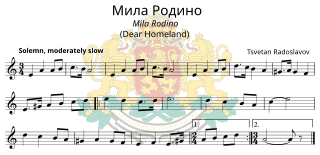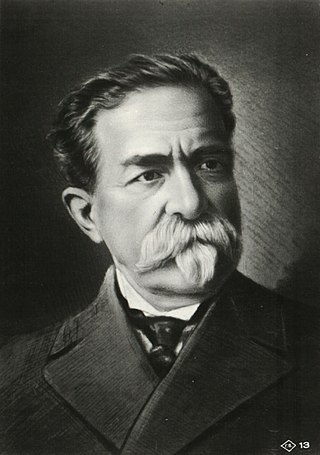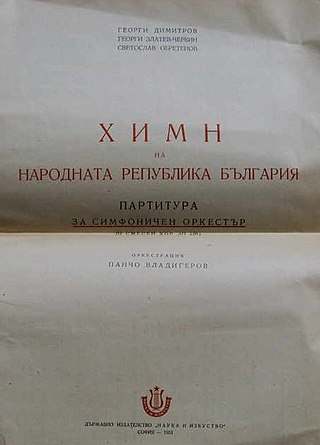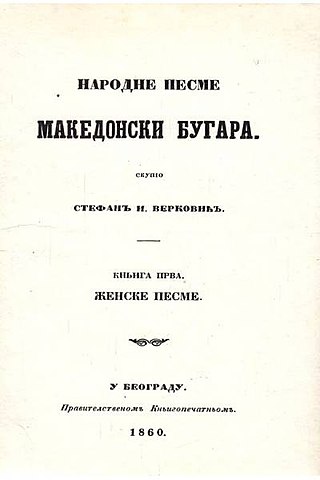Върви, народе възродени,
към светла бъднина върви,
с книжовността, таз сила нова,
съдбините си поднови!
Върви към мощната просвета!…
В световните борби върви
от длъжност неизменно воден —
и Бог ще те благослови!
Напред! Науката е слънце,
което във душите грей!
Напред! Народността не пада
там, дето знаньето живей!
Безвестен беше ти, безславен!…
О, влез в историята веч,
духовно покори страните,
които завладя със меч!
Тъй солунските двама братя
насърчваха дедите ни…
О, минало незабравимо,
о, пресвещени старини!
България остана вярна
на достославний тоз завет —
в тържествованье и в страданье
извърши подвизи безчет…
Да, ро̀дината ни години
пресветли преживя, в беда
неописуема изпадна,
но върши дългът си всегда!
Бе време, писмеността наша
кога обходи целий мир;
за всесветовната просвета
тя бе неизчерпаем вир;
бе и тъжовно робско време…
Тогаз балканский храбър син
навеждаше лице под гнета
на отоманский властелин…
Но винаги духът народен
подпорка търсеше у вас,
о, мъдреци!… През десет века
сé жив остана ваший глас!
О, вий, които цяло племе
извлякохте из мрътвина,
народен гений възкресихте —
заспал в глубока тъмнина;
подвижници за права вяра,
сеятели на правда, мир,
апостоли високославни,
звезди върху славянски мир,
бъдете преблагословени,
о вий, Методий и Кирил,
отци на българското знанье,
творци на наший говор мил!
Нек' името ви да живее
във всенародната любов,
речта ви мощна нек' се помни
в славянството во век веков! | Vǎrvi, narode vǎzrodeni,
kǎm svetla bǎdnina vǎrvi,
s knižovnostta, taz sila nova,
sǎdbinite si podnovi!
Vǎrvi kǎm moštnata prosveta!…
V svetovnite borbi vǎrvi
ot dlǎžnost neizmenno voden —
i Bog šte te blagoslovi!
Napred! Naukata e slǎnce,
koeto vǎv dušite grej!
Napred! Narodnostta ne pada
tam, deto znanjeto živej!
Bezvesten beše ti, bezslaven!…
O, vlez v istorijata več,
duhovno pokori stranite,
koito zavladja sǎs meč!
Tǎj solunskite dvama bratja
nasǎrčvaha dedite ni…
O, minalo nezabravimo,
o, presvešteni starini!
Bǎlgarija ostana vjarna
na dostoslavnij toz zavet —
v tǎržestvovanje i v stradanje
izvǎrši podvizi bezčet…
Da, ròdinata ni godini
presvetli preživja, v beda
neopisuema izpadna,
no vǎrši dǎlgǎt si vsegda!
Be vreme, pismenostta naša
koga obhodi celij mir;
za vsesvetovnata prosveta
tja be neizčerpaem vir;
be i tǎžovno robsko vreme…
Togaz balkanskij hrabǎr sin
naveždaše lice pod gneta
na otomanskij vlastelin…
No vinagi duhǎt naroden
podporka tǎrseše u vas,
o, mǎdreci!… Prez deset veka
sé živ ostana vašij glas!
O, vij, koito cjalo pleme
izvljakohte is mrǎtvina,
naroden genij vǎzkresihte —
zaspal v gluboka tǎmnina;
podvižnici za prava vjara,
sejateli na pravda, mir,
apostoli visokoslavni,
zvezdi vǎrhu slavjanski mir,
bǎdete preblagosloveni,
o vij, Metodij i Kiril,
otci na bǎlgarskoto znanje,
tvorci na našij govor mil!
Nek' imeto vi da živee
vǎv vsenarodnata ljubov,
rečta vi moštna nek' se pomni
v slavjanstvoto vo vek vekov! |

















